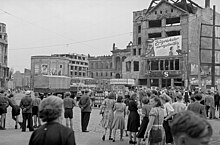Irregular train traffic
| Movie | |
|---|---|
| Original title | Irregular train traffic |
| Country of production | GDR |
| original language | German |
| Publishing year | 1951 |
| length | 82 minutes |
| Rod | |
| Director | Erich friend |
| script |
Peter Bejach Hermann Turowski |
| production | DEFA |
| music | Franz R. Friedl |
| camera | Willi Kuhle |
| cut | Ferdinand Weintraub |
| occupation | |
| |
Train irregularly is a German crime film of the DEFA of Erich friend from the year 1951 .
action
The film begins with a look back, which documents the beginning of the friendship between the police officer Erich and the driver Jochen. Jochen, who happens to be passing by, saves the life of the policeman who is shot by criminals and thrown into a canal.
Erich takes care of the needs of his new friend in the following time. He also got him a job as a supervisory officer at the stock exchange station of the Berlin S-Bahn, which belongs to the Deutsche Reichsbahn. The two even live together. When one day a lady from West Berlin misses her train and wants to complain to Jochen about it, Jochen takes a liking to beautiful Ellen. In turn it occurs to her that the man could be useful for the American agent organization she works for, and she accidentally drops a notebook with her address on it. When Jochen brings this to her apartment, she and her boss make him an offer to do smaller tasks for this organization for good money. The wealth beckons, and Inge, once Erich's friend, also leaves him to live with Jochen. She still has no idea what she has gotten herself into. He quits his job at the Reichsbahn in high spirits, which is not really what his new clients want, because his main task is to carry out acts of sabotage on the S-Bahn in East Berlin. Erich, who caught him doing such an action during a nightly watch, but did not report it to his superior, told Inge about his observation. Inge then confronts Jochen and he promises her to give up this dangerous business. But Bettina, a friend of Inges, also tells her that she saw Jochen in a clear situation with a beautiful woman.
Jochen's good resolutions will soon be over, and he lets his "colleagues" persuade him to do another big job with several schnapps. To sleep off the intoxication, he lies down again in his apartment, not without first setting the alarm. Inge, who had previously asked him for money, to which he denied, finds several large banknotes and a letter in Ellen's handwriting in his wallet. With this letter she goes to Erich, because on the back there is a detailed drawing for the planned attack on the S-Bahn on Museum Island. Thanks to their information, the People's Police are able to prevent the planned attack, the saboteurs are arrested, and Jochen is killed.
production
The film was made in the Atelier Berlin-Johannisthal and at stations of the Berlin S-Bahn. The buildings were created by Willy Schiller and Artur Schwarz , and Richard Brandt was the production manager .
Irregular train traffic premiered on July 27, 1951 in the Berlin DEFA film theater on Kastanienallee and in the film theater on Friedrichshain (Berlin).
During the World Youth Games in early August 1951, the film was advertised on a large poster on the front of the ruins of the Pschorrhaus on Potsdamer Platz .
Against the backdrop of the divided city of Berlin, the film had a clearly educational and political issue.
criticism
Lothar Kusche found in the Berliner Zeitung that the film suffers on the one hand from the speech bacillus and on the other hand from the random bacillus, so that it is not possible to get down to the essentials in the artistic design, i.e. to the typical.
The people's correspondent Lothar Künzel wrote in the Neue Filmwelt : "The topic is realistic, and the film also underlines the great importance of our increased vigilance towards the enemies of our people"
Gerhard Rostin came to the conclusion in the Neue Zeit of July 21, 1951 that the script is the greatest weak point of the film.
literature
- F.-B. Habel : The great lexicon of DEFA feature films . Schwarzkopf & Schwarzkopf, Berlin 2000, ISBN 3-89602-349-7 , pp. 710-711 .
Web links
- Train irregularly in the Internet Movie Database (English)
- Irregular train traffic at filmportal.de
- Irregular train traffic at the DEFA Foundation
Individual evidence
- ^ Alfred Bauer : German feature film Almanach. Volume 2: 1946-1955 , p. 238
- ^ Lothar Kusche in the Berliner Zeitung of July 29, 1951.
- ^ Lothar Künzel in the Neue Filmwelt no .: 11/1952.
- ^ Gerhard Rostin in the New Era of July 21, 1951.
